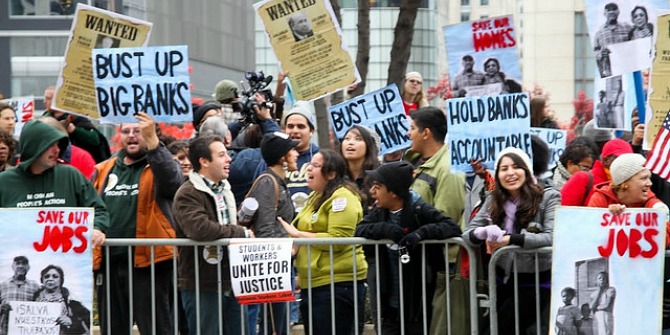Charles Crawford looks into the theories behind why our behaviour is not always as ethical as we think it might be, and the growing policy trend of ‘nudging’ personal choices.
Blind Spots: Why We Fail to Do What’s Right and What to Do About It. Max H. Bazerman and Ann E. Tenbrunsel. Princeton University Press. April 2011.
Find this book at: ![]() Google Books
Google Books ![]() Amazon
Amazon ![]() LSE Library
LSE Library
 Professors Max Bazerman and Ann Tenbrunsel (Harvard Business School and University of Notre Dame respectively) give us many unexpected and useful insights into why our behaviour is not always as ethical as we might think it is (i.e. Why We Fail to Do What’s Right). They are less convincing, however, in explaining What to Do About It.
Professors Max Bazerman and Ann Tenbrunsel (Harvard Business School and University of Notre Dame respectively) give us many unexpected and useful insights into why our behaviour is not always as ethical as we might think it is (i.e. Why We Fail to Do What’s Right). They are less convincing, however, in explaining What to Do About It.
These days all sorts of ingenious studies set out to measure ‘ethicality’, and to identify why people privately and at work fall short of the moral standards that they themselves champion. The authors share many vivid, well researched examples:
- In one university, books on ethics are more likely to go missing from libraries than non-ethics books;
- Organisational diversity programs can lead to reduced diversity;
- Setting up punitive systems (e.g. fines) to deter unwanted behaviour can prompt more of the unwanted behaviour – people may stop looking at that behaviour in ethical terms and instead treat the issue as a simple cost problem: “What’s it worth to me to avoid being caught?” (This last one makes especially depressing reading when we contemplate the thousands of new criminal offences set up under the UK’s recent Labour governments.)
The authors convincingly draw on these and other studies to explore how misconceived self-awareness creates ‘bounded ethicality’ and moral blind spots. People tend subconsciously to discriminate in favour of ‘their’ group, even with the best intentions to do the opposite. Or they may genuinely fail to spot that their short-term private or corporate actions have longer-term negative moral consequences. Or they can tend to explain away unethical behaviour by their group while focusing on supposed unethical behaviour by others. And so on.
This book takes such studies and accompanying methodology to look at different big-ticket policy outcomes in the public and private sector (how far car-makers should install safety features, unsatisfactory US laws on transparency by big accounting firms, controversial climate change legislation, the US federal budget deficit). They argue that in each case better outcomes could have been achieved had the key people involved been more aware of their own unconscious biases.
Having identified many subtle problems, the authors do less well in identifying ways to improve things. No surprise here – reasonable people flatly disagree over which outcomes (and methods) are or aren’t ‘ethical’.
The authors argue that organisations should listen to their own ‘organisational talk’ – what examples are widely cited of virtue (or bad behaviour) being rewarded? They describe how one Fortune 50 corporation produced a video describing how four of its employees had gone over their bosses’ heads to keep the corporation from acting unethically; the video concluded by showing those four people in senior positions. The message to its employees was clear: that corporation took ethical issues seriously and rewarded employees who responded, especially when it seemed professionally risky to do so.
Another example is less convincing. The authors seem to favour the state enforcing a default ‘opt-out’ organ donor policies (i.e. allowing a dead person’s organs to be used to help others unless the person concerned had asked that that not be done). Some countries do, others don’t. Those who do have an ‘opt-out’ policy see many more lives saved, as there are more organs available for emergency transplant. But are such ‘consequentialist’ outcomes the only ones that count?
The authors likewise draw on fashionable ‘nudge’ ideas to call for more regulations to lay down lower default energy settings for home electrical equipment, having previously (as noted above) pointed out that undue regulation backed by sanctions can lead to more of the unwanted behaviour. The authors do not explain how to value personal choice, even if it leads to outcomes which may seem superficially unethical or downright perverse.
One example of my own. In Country A where the speed limit is 20 miles per hour there are far fewer road deaths than Country B, where the limit is 70 miles per hour. But is Country A’s approach ipso facto more ‘ethical’? It all turns on how people individually and collectively allocate risk – and who decides. How many British towns would have speed cameras if local residents could vote on them? At what point do we end up with so many such regulations that life becomes miserable?
Charles Crawford is a former British diplomat who served extensively in post-communist Europe where the transition to modern pluralism pointed up many new ethical issues.
Find this book at: ![]() Google Books
Google Books ![]() Amazon
Amazon ![]() LSE Library
LSE Library





